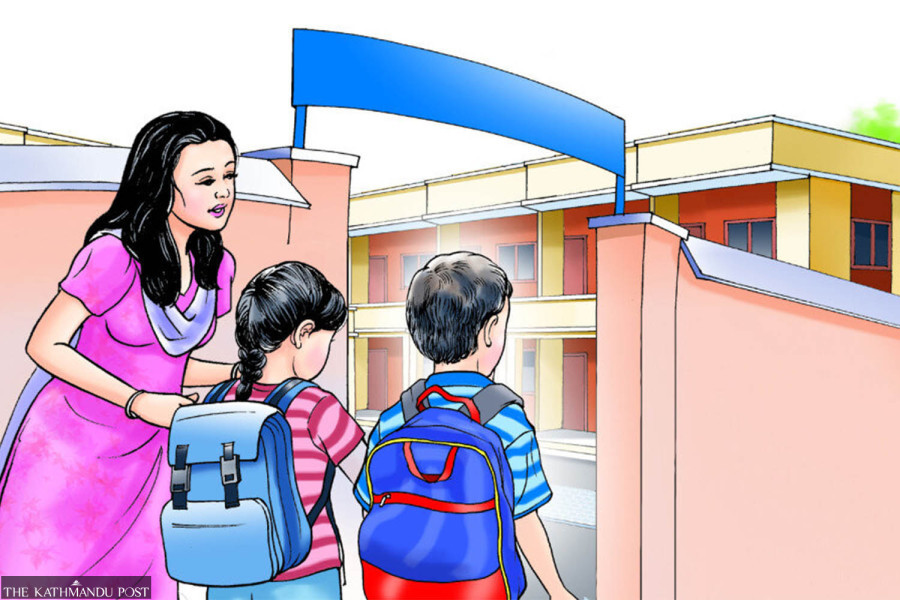Politics
Parliamentary panel locked in dispute over private schools’ future
As ruling and opposition lawmakers clash, the school education bill risks missing the June 29 passage deadline.
Binod Ghimire
The Education, Health and Information Technology Committee of the House of Representatives is struggling to finalise the school education bill, as cross-party lawmakers remain deeply divided over provisions to regulate private schools.
While most of the ruling party lawmakers want the privately owned schools to continue to operate in the way they are doing, opposition lawmakers are pushing to make them service-oriented. At Thursday’s meeting, opposition leaders strongly stood for mandatorily converting the schools registered under the Company Act into trusts by allowing them a few years to transition. But most ruling party lawmakers argued that such a move should be voluntary.
The provision relating to regulating private schools has become the most contentious issue in finalising the bill. Those advocating for converting them into trusts argue that education should not be treated as a profit-making sector, but others claim controlling them would go against the principle of a three-pillar economy—public, private, and cooperative.
Stating that converting private schools into trusts is a must for turning them into service-oriented from profit-making, Rastriya Swantantra Party lawmaker Sumana Shrestha argued that they should be given 15 years to make the shift.
“Let’s set a time limit. Fifteen years means the full cycle of a school that begins with Early Childhood Development,” she said. “Their bank loans [if any] can also be settled in that period. Allowing them to function as they do now goes against the very spirit of the constitution. It would be a betrayal of the public.” Shrestha said conversion to trusts does not mean nationalisation but just a move to make them non-profit.
Amid growing complaints that private schools charge exorbitantly and have become profit-oriented, experts have long been calling for converting them into trusts. Dozens of lawmakers have registered proposals to amend the bill demanding their conversion into trusts.
However, others want them to continue operating under the Company Act. “Private schools exist in every country—even in China. Let’s not prohibit them,” said Nepali Congress chief whip Shyam Ghimire.
He said rather than changing their registration, focus should be on effective regulation, transparent scholarships and setting minimum standards of their operation.
Chhabilal Bishwakarma, CPN-UML lawmaker who is also the coordinator of a sub-panel, echoed Sharma’s position. “The contribution of private schools cannot be undervalued,” he said. “Improving the quality of community schools would naturally reduce the number of private ones.”
The UML has always stood against regulating private schools. Prime minister and the party’s chair KP Sharma Oli often praises private schools and blames public schools for substandard education.
On January 15, 2019, a high-level education commission submitted its report to then prime minister, Oli, recommending the conversion of the private schools into trusts within 10 years. This would, according to the commission, stop the commercialisation of education.
However, Oli never made the report public. His successor, Sher Bahadur Deuba, followed suit. It was only when Rastriya Swatantra Party’s Shrestha became the education minister in the erstwhile Pushpa Kamal Dahal government was the report made public.
The commission, according to its members, made its recommendations based on Article 31(2) of the Constitution, which makes the state responsible for compulsory basic and free secondary education for all. The commission said that leaving private educators to “generate profit”, as they currently do, would be tantamount to a breach of the constitution.
Putting his view in Thursday's meeting, CPN (Maoist Centre) lawmaker Devendra Paudel, who also is a former education minister, said education is a service-oriented sector therefore, the schools should be converted into trusts.
“The constitution mandates compulsory and free education up to grade eight, so we need to move ahead with a defined timeframe to convert the private schools’ ownership. The government must be courageous enough to implement it,” he said.
Rekha Sharma of the Maoist Centre shared the same position. “If medical colleges can be regulated, why not schools?” she said. “A grocery shop, a plastics factory, and a school are not the same. Therefore, what’s written in the constitution must be implemented. It cannot be that private schools will remain private forever. The state must show courage and determination [to convert them into trusts].”
On April 30, chief whips of the Congress and the UML inked a deal with the Nepal Teachers’ Federation to get the bill endorsed from the lower house by June 29. Two days to go for the deadline, the committee is yet to finalise it. Its meeting on Friday is expected to endorse the bill. The House of Representatives meets again on Saturday.




 11.12°C Kathmandu
11.12°C Kathmandu















